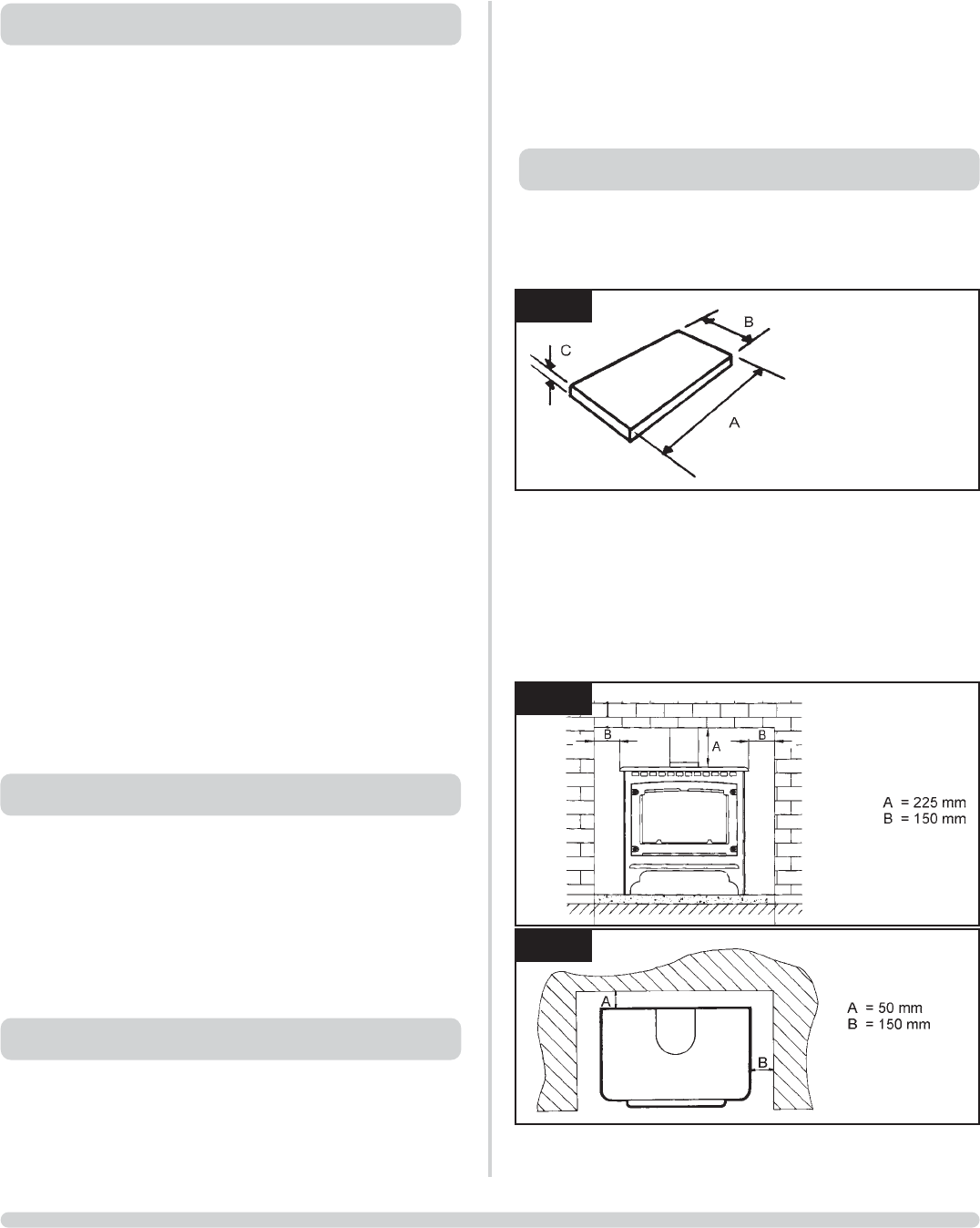
11
INSTALLATION INSTRUCTIONS
SITE REQUIREMENTS
1.1 The chimney or flue system must comply with the rules in
force, and must be a minimum of 127mm in diameter. (5").
1.2 The minimum height of the flue or chimney must be 3 metres
(10ft). Any horizontal flue run from the rear outlet should not
exceed 100mm from the back of the appliance.
1.3 The chimney or flue must be free from any obstruction. Any
damper plates should be removed or secured in the fully open
position and no restrictor plates should be fitted.
1.4 The chimney should be swept prior to the installation of the
appliance, but where it can be seen that the chimney is clean
and unobstructed throughout its entire length, it need not be
swept.
NOTE: If it is intended to fit the stove into an existing brick-
built chimney without a closure plate*, a 5" (127mm) liner
must be used. Larger lined flues may work, but in some
instances could cause cold start flue problems resulting in
nuisance shutdown. Lined flues above 7" (175mm) are not
recommended.
Due to recent changes to European chimney standards, new
flues and chimneys are now described by their temperature,
pressure and resistance to corrosion, condensation and fire. To
assist in identifying the correct flue system, the minimum flue
specification is shown in the Technical Specification in this
manual. Existing chimneys are not covered by this system.
1.5 *Closure Plate Installation
Small and Medium stoves can be installed into a Standard,
fireplace opening with the optional closure plate and spigot
extension made for the appliance.
Note the stove and plate will require removing, when
carrying out the annual service.
The small Marlborough stove is also approved with a Closure
plate for installation into pre-cast letterbox flues conforming to
BS 1289:1986. with a minimum flue cross sectional area of
16500mm2 and a minimum dimension of 90mm.
2.1 The large stove has a rated output in excess of 7Kw and
requires a minimum of 11cm
2
permanent effective free air.
This is in addition to any window that opens, and although
it must communicate with the outside air whenver possible,
it can communicate with an adjacent room providing such
space has a similar opening to the outside. The small and
medium stoves have a rated output below 7Kw and do not
normally require any additional ventilation.
3.1 Before installation, ensure the local distribution conditions
(identification of the type of gas and pressure) and the
adjustment of the appliance are compatible.
3.2 Ensure that the gas supply is capable of delivering the
required amount of gas, and is in accordance with the rules
in force.
3.3 Soft copper tubing and soft soldered joints can be used but
must not be closer than 50mm to the base of the tray.
3.4 A means of isolating the gas supply to the appliance must
be provided, independent of any appliance control.
3.5 All supply gas pipes must be purged of any debris that may
have entered, prior to connection to the appliance.
4.1 This appliance must stand on a non-combustible hearth that
is at least 12mm thick, and project a minimum of 50mm
from the base of the stove in all directions.
4.2 This appliance must not be installed in a room that contains
a bath or shower.
4.3 The stove is not suitable for installation against a
combustible wall; all combustible materials must be
removed from the area behind the stove.
4.4 The position of the appliance must comply with the
minimum clearances forcombustionable materials as shown
in diagram 2 and 2A.
In a non-combustible recess, attention must be given to
allowing adequate clearance at the sides and rear of the
stove, so that a spillage test can be performed, and the
controls reached.
3. INSTALLATION OF THE GAS SUPPLY
2. VENTILATION
4. APPLIANCE LOCATION
2
2A
1
Small Medium Large
A = 522mm 679mm 775mm
B = 390mm 445mm 440mm
C = 12mm 12mm 12mm
1. FLUE AND CHIMNEY REQUIREMENTS
AR0604
AR0531
AR0522


















